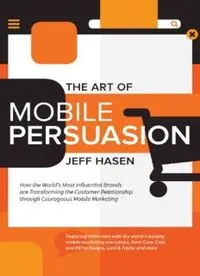
The Art of Mobile Persuasion: How the World's Most Influential Brands are Transforming the Customer Relationship through Courageous Mobile Marketing PDF
Preview The Art of Mobile Persuasion: How the World's Most Influential Brands are Transforming the Customer Relationship through Courageous Mobile Marketing
THE ART OF MOBILE PERSUASION Table of Contents The Art of Mobile Persuasion Introduction The Mobile Universe Personalization Retail Trust Customer Journey Machine Vs. Human Where Are We With Mobile? New Technologies How to View Innovation New Breed of Marketer Epilogue Notes Acknowledgements The Experts About the Author The Art of Mobile Persuasion How the World’s Most Influential Brands are Transforming the Customer Relationship through Courageous Mobile Marketing Featuring interviews with the world’s leading mobile marketing executives, from Coca-Cola and REI to Google, Lord & Taylor and more. Copyright © 2015 by Jeff Hasen. All rights reserved. No part of this publication may be reproduced, distributed, or transmitted in any form or by any means, including photocopying, recording, or other electronic or mechanical methods, without the prior written permission of the publisher, except in the case of brief quotations embodied in critical reviews and certain other noncommercial uses permitted by copyright law. For permission requests, write to the publisher: This book is dedicated to my wife, Kathryn, who saw something in me and in us that changed my life; to my mother, who forever has had my back; and to the memory of my father, who powers me forward and is with me always. Introduction The Big Relationship This is a book about relationships. And unlike the 314,011 other titles on Amazon that attempt to provide insights on him or her, on love and marriage, this is a book about the one relationship many of us prize above all others: The one we have with our mobile phone. Yours may look the same as someone else’s. You may share a case, or a ringtone. But with more than three million apps available for download – and 1,000 being added to the Apple App Store every single day – it’s likely that you’ve tricked out your device differently than your neighbor’s, and differently than mine. You’ve also placed bookmarks on your favorite web pages. You’ve added your must-see videos and photos. And you’ve likely created a one-of-a-kind homescreen – the picture of your son at his first birthday party, or the King Charles Cavalier Spaniel wearing a “12th Dog” jacket to cheer on your beloved Seahawks. “People don’t have a relationship with a television set or their computer,” longtime adman Hank Wasiak told me. “Maybe they do with their car. Maybe. But they all have a relationship with their device. It is part of them.” No surprise that brand marketers like us are desperate to get in on the action. But will consumers let us in? If two is company, does three create a crowd? Is it possible that marketing could enhance this vital relationship, improving the mobile experience for the user by providing value? And is that what the wireless device owner wants? At what price – for us and for them? The Big Challenges The number of smartphones sold worldwide in 2014 exceeded 1.2 billion. Adults in the U.S. spent 23 percent more time on mobile phones during an average day in 2014 than in 2013. Brands know that the channel provides unmatched opportunities. Google’s Jason Spero believes that we as marketers are now in the “urgency” phase. The time to act is now. But we have more than a small list of challenges. Among them: Even if a consumer invites us into their mobile lives, how are we brands to operate? Standing in the doorway like strangers hawking wares from door to door? Or like old friends who put their feet on the furniture and stay all night? And how do we handle user expectations? I’ve never, ever had a meatball sandwich from your quick-service restaurant, but you, Meatball Marketer, should know from my purchase history that my diet is vegetarian. So why am I still getting those damn meatball ads? What about the customer journey? If I’m looking at an Armani tie online tonight, should you target me tomorrow when I’m near Nordstrom? What’s personal and what’s creepy? How does the ever-increasing “self-sufficient” mobile shopper force us to re-shape our definition of differentiated customer service? What’s the role of today’s marketer? Are we replaceable by mechanized data parses and auto- targeting? I told you the challenges weren’t small. If you’re reading this, you know how big they are, and how large they loom – present in every meeting, hovering over every budget decision, and haunting every campaign. Big Thinking They’re big challenges. But they’re ours to conquer. But only if we think big. I visited some of the brightest minds in mobile, marketing and business, seeking answers the toughest questions facing marketers in the mobile era. Answers came from Google, The Coca-Cola Company, REI, ESPN, Lowe’s, Expedia, Lord & Taylor, and more. This book is built on their discoveries. The insights gleaned and lessons learned are for all of us who have mobile-fueled aspirations to bring a brand closer to the customer. Some of those bright lights will talk to us about innovation – how to define it, how to enact it, how to sell it into organizations, how to deliver it, and where to look next in a mobile world that is constantly changing. Others will talk about the central values that guide us through uncharted territory. Things like Satisfaction, Dreaming, Motivation – three that Spero holds up as the deep reasons we all use mobile in the first place. Still others will inspire us to embrace the winds of change to become marketers equipped to act on these new paths to persuasion. One of those interviewees, Tom Daly, a senior executive from Coca-Cola, told me that he won’t rest until every consumer on the
